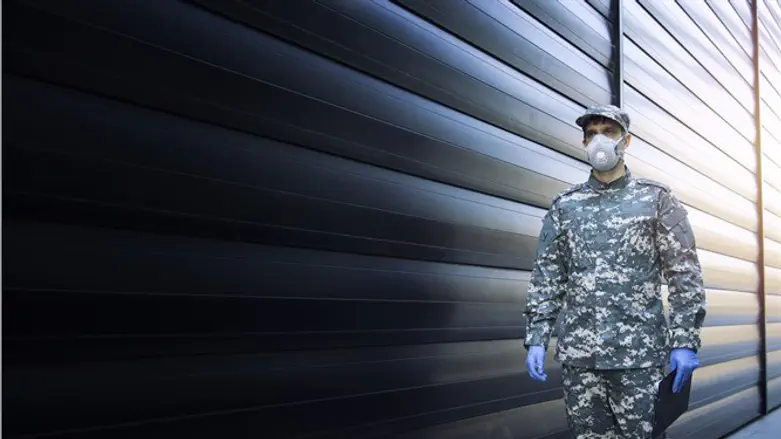
American Institute for Economic Research (AIER) Editorial Director Jeffrey A. Tucker reports a study conducted by Icahn School of Medicine at Mount Sinai in cooperation with the Naval Medical Research Center sought to test lockdowns along with testing and isolation, and found that even a military-enforced extreme quarantine cannot stop COVID-19.
In May, 3,143 new Marine recruits were given the option to participate in a study of frequent testing under extreme quarantine. The study was called CHARM, which stands for COVID-19 Health Action Response for Marines.
Of recruits asked, a total of 1,848 agreed to be subjects in this experiment “which included weekly qPCR testing and blood sampling for IgG antibody assessment.”
In addition, the CHARM study volunteers who did test positively “on the day of enrollment (day 0) or on day 7 or day 14 were separated from their roommates and were placed in isolation.”
The study explains that the recruits faced a stricter regime than existed in civilian life. All recruits, even those not in the CHARM group, did the following:
"All recruits wore double-layered cloth masks at all times indoors and outdoors, except when sleeping or eating; practiced social distancing of at least 6 feet; were not allowed to leave campus; did not have access to personal electronics and other items that might contribute to surface transmission; and routinely washed their hands.
"They slept in double-occupancy rooms with sinks, ate in shared dining facilities, and used shared bathrooms. All recruits cleaned their rooms daily, sanitized bathrooms after each use with bleach wipes, and ate pre-plated meals in a dining hall that was cleaned with bleach after each platoon had eaten.
"Most instruction and exercises were conducted outdoors.
"All movement of recruits was supervised, and unidirectional flow was implemented, with designated building entry and exit points to minimize contact among persons.
"All recruits, regardless of participation in the study, underwent daily temperature and symptom screening. Six instructors who were assigned to each platoon worked in 8-hour shifts and enforced the quarantine measures. If recruits reported any signs or symptoms consistent with COVID-19, they reported to sick call, underwent rapid qPCR testing for SARS-CoV-2, and were placed in isolation pending the results of testing.
"Instructors were also restricted to campus, were required to wear masks, were provided with preplated meals, and underwent daily temperature checks and symptom screening.
"Instructors who were assigned to a platoon in which a positive case was diagnosed underwent rapid qPCR testing for SARS-CoV-2, and, if the result was positive, the instructor was removed from duty.
"Recruits and instructors were prohibited from interacting with campus support staff, such as janitorial and food-service personnel. After each class completed quarantine, a deep bleach cleaning of surfaces was performed in the bathrooms, showers, bedrooms, and hallways in the dormitories, and the dormitory remained unoccupied for at least 72 hours before reoccupancy."
The New England Journal of Medicine study results were that the virus still spread, though 90% of those who tested positive were asymptomatic. "Incredibly, 2% of the CHARM recruits still contracted the virus, even if all but one remained asymptomatic. 'Our study showed that in a group of predominantly young male military recruits, approximately 2% became positive for SARS-CoV-2, as determined by qPCR assay, during a 2-week, strictly enforced quarantine'.”
Comparing these results with the control group that was not tested and not isolated, nonparticipants actually contracted the virus at a slightly lower rate than those who were under an extreme regime.
Conversely, extreme enforcement of NPIs plus more frequent testing and isolation was associated with a greater degree of infection.
Significantly, the study received little meaningful media attention. AEIR's Tucker writes: "Here are four actual media headlines about the study that miss the point entirely:
- CNN: 'Many military COVID-19 cases are asymptomatic, studies show';
- SciTech Daily: 'Asymptomatic COVID-19 Transmission Revealed Through Study of 2,000 Marine Recruits';
- ABC: 'Broad study of Marine recruits shows limits of COVID-19 symptom screening';
- US Navy: 'Navy/Marine Corps COVID-19 Study Findings Published in New England Journal of Medicine'.
"No national news story that I have found highlighted the most important finding of all: Extreme quarantine plus frequent testing and isolation among military recruits did nothing to stop the virus."
Tucker notes at the end of the article: "The earliest version of this article misstated the conditions of the control group. They were equally locked down with those who participated in the study. The difference between the two concerned testing frequency and the isolation response. This does not affect this article’s conclusion; indeed it strengthens it: even under extreme measures, the virus spread, and more so with the extra measure intended to control the virus. Nearly all infections were without symptoms."
